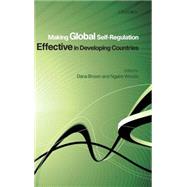
Note: Supplemental materials are not guaranteed with Rental or Used book purchases.
Purchase Benefits
What is included with this book?
| List of Figures | p. vii |
| List of Tables | p. viii |
| List of Contributors | p. ix |
| Introduction | p. 1 |
| Making Corporate Self-Regulation Effective in Developing Countries | p. 6 |
| Do Voluntary Standards Work Among Governments? The Experience of International Financial Standards in East Asia | p. 32 |
| Do Voluntary Standards Work Among Corporations? The Experience of the Chemicals Industry | p. 62 |
| Making Disclosure Work Better: The Experience of Investor-Driven Environmental Disclosure | p. 78 |
| Bringing in Social Actors: Accountability and Regulation in the Global Textiles and Apparel Industry | p. 113 |
| Responsive Regulation and Developing Economies | p. 149 |
| Using International Institutions to Enhance Self-Regulation: The Case of Labor Rights in Cambodia | p. 175 |
| Local Politics and the Regulation of Global Water Suppliers in South Africa | p. 201 |
| Self-Regulation in a World of States | p. 227 |
| Index | p. 260 |
| Table of Contents provided by Ingram. All Rights Reserved. |
The New copy of this book will include any supplemental materials advertised. Please check the title of the book to determine if it should include any access cards, study guides, lab manuals, CDs, etc.
The Used, Rental and eBook copies of this book are not guaranteed to include any supplemental materials. Typically, only the book itself is included. This is true even if the title states it includes any access cards, study guides, lab manuals, CDs, etc.